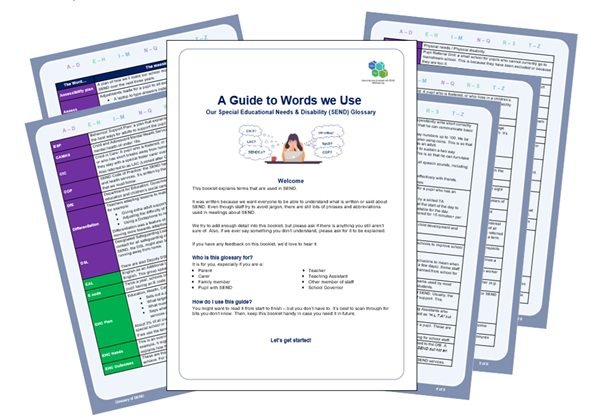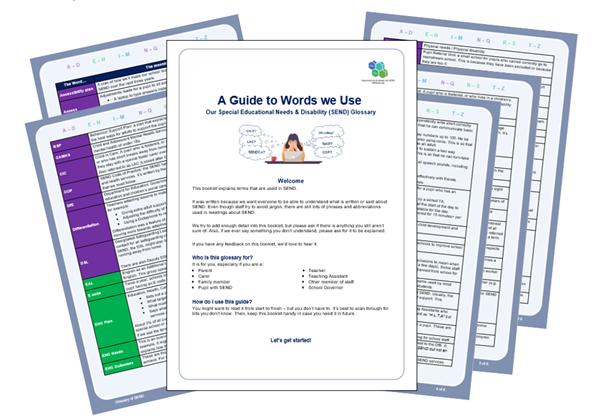80 of the most common SEND terms explained: A free guide
Whether you are new to SEND or have been around for many years, you’ll know that jargon is very common:
- “The child may have SLCN“
- “We get a set amount of EP time each year.”
- “School will meet needs by adaptive teaching.”
A school does not have to provide a guide to the SEND terms they use. Some do, but if your school doesn’t the free guide below is here to help (it’s also known as a SEND glossary).
A helpful guide to SEND Terms
This guide gives you the most common SEND terms – over 80, in order from Accessibility Plan, Access and ADHD. It’s ideal for staff, governors and families of children at primary school.
Do I read it cover to cover, or keep it as a guide?
It’s up to you. Both options will help you in your meetings about SEND.

Information should be as accessible as possible. This guide is as accessible as we could make it, including:
- Pale background for dyslexia
- Sans serif font
- Colour coded sections to help people navigate around
- Alt text (hidden text that explains images to visually impaired people).
The guide stays true to the content but also has a reading age of 12 years old. This makes the guide an ideal tool for everybody. That includes people who struggle with reading or who speak English as an additional language (EAL).
Best of all – it costs nothing. We simply ask that you give credit and don’t pass this work off as your own.
At SEND meetings, can I ask what a SEND term means?
Yes. There are many different SEND and the guide doesn’t include every condition that might affect pupils.
Therefore, we all can still be confused in meetings. We ask ourselves “Should I know that already?” or “What will people think if I ask?”
It is ok for parents, family members and governors to ask. After all, there is a lot of jargon. Remember that even SENCos need to ask about SEND terms sometimes (e.g. RPI). There is a saying that the only bad question is the one that’s not been asked. That’s mostly true – but not always:

Finally, some of the services that support SEND are have different names in each council (e.g. autism support teams). If you are a SENCo, you can tweak the guide to reflect your local services.
We hope that the SEND glossary helps you navigate through the SEND maze.
Where can I get more help on SEND terms?
- Visit Support SEND kids and ask a question to their SEND community.
- Or, get in touch with us via our contact page (e.g. to ask for a Word version of the guide).
More great reads
- Can someone with ADHD or autism join the UK forces?
- What are the costs of SEND Tribunals?
- School Suspensions 2023: What’s going on?
Get in touch
Have a question? Think we could help you? Please contact us to discuss how we might help you.
Drop us an email or give us a call
director@9000lives.org
0788 42 42 719


